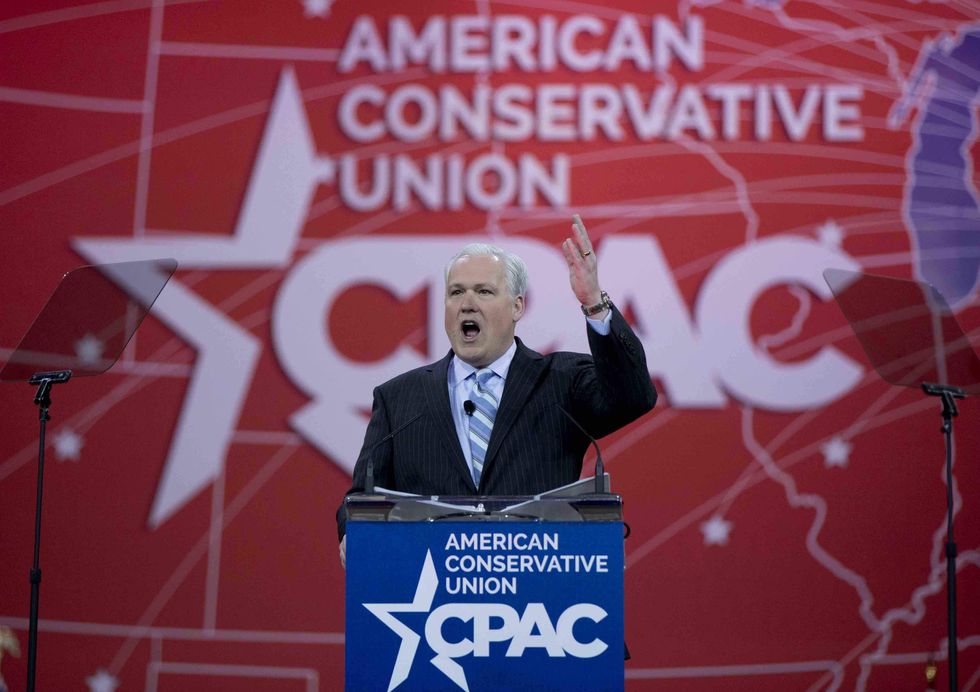
American Conservative Union Chairman Matt Schlapp speaks during the Conservative Political Action Conference. (AP Photo/Carolyn Kaster)

It’s undeniable the modern political environment is akin to Superman’s Bizarro World. Down is up, up is down, and everything you thought you knew has been twisted and distorted.
Take, for example, the Conservative Political Action Conference’s recent decision to make the renegade Milo Yiannopoulos a speaker at the highly touted event. Yiannopoulos has been an editor at Breitbart.com who has risen to prominence over the past year for his controversial commentaries on everything from homosexuality to transgender bathrooms and his radical views on nationalism and race and religion.
Yiannopoulos is the very definition of a provocateur, and he’s done quite well for himself as such. He’s managed to spark outrage in just about every corner of the country, and he’s earned a nice profit doing it. In case you’re not familiar with him, Yiannopoulos is so haughty, brash, and insulting, he makes Ann Coulter look like Martha Stewart.
However, he’s hardly the sort of person you’d expect to see as a speaker at CPAC. Not only has Yiannopoulos turned hurling insults into an art form and routinely ridiculed the traditional wing of the conservative movement, he’s been one of the country’s biggest advocates of the “alt-right” and using, rather than limiting, government to accomplish his own peculiar set of goals.
Even in a world in which Donald Trump is president of the United States, Yiannopoulos is a controversial choice, at best, and a clear move away from the values CPAC has long espoused. Can you imagine Ronald Reagan or William F. Buckley Jr. speaking at the same event as the architect of the “Dangerous Faggot Tour”? I can’t, and apparently neither can the thousands of conservatives who expressed their extreme displeasure Monday at Matt Schlapp, chairman of the American Conservative Union, CPAC’s organizer.
In Schlapp’s announcement of the decision to have Yiannopoulos speak, he wrote on Twitter, “We think free speech includes hearing Yiannopoulos’s important perspective.” Schlapp also cited free speech in his multiple subsequent defenses of the choice — until, that is, a video of Yiannopoulos seemingly approving of pedophilia surfaced.
On the tape, Yiannopoulos said, among other totally unhinged things, “In the homosexual world, particularly, some of those relationships between younger boys and older men — the sort of ‘coming of age’ relationship — those relationships in which those older men help those young boys discover who they are and give them security and safety and provide them with love and a reliable, sort of rock, where they can’t speak to their parents.”
Soon after the video surfaced, Schlapp announced Yiannopoulos’s CPAC speaking invitation had been rescinded, citing the “revelation of an offensive video” as the primary factor in the decision.
The choice to remove Yiannopoulos from the speaking rolls was an obvious and necessary one, but in truth, Yiannopoulos has said many other disturbing, bizarre and controversial comments in the past — plenty, in fact, to make it plain he had no business being invited to CPAC in the first place. Schlapp would later reiterate his reason for inviting Yiannopoulos to speak was to show free speech is welcome at CPAC and supported by conservatives. But if free speech really was the primary motivation behind the choice, then why disinvite Yiannopoulos? Doesn’t he have a free speech right to spew crazy theories about pedophilia?
By choosing to disinvite Yiannopoulos, Schlapp acknowledged the truth that as a private event, there is no such thing as “free speech” at CPAC. If there was, Rachael Maddow and Susan Sarandon would attend CPAC as well, just to tell all those radical, right-wing nuts why they ought to be card-carrying Democratic Party socialists.
The same sort of convoluted logic has been applied by liberals across the country who want to ban conservative speakers to protect “diversity,” an obviously contradictory view, and most recently by the liberal press, who have been lamenting about Trump’s attacks on the media. They, too, say free speech and freedom of the press protect them against Trump’s verbal assaults, all while they spend their days in a perpetual state of verbally attacking Trump.
It seems people don’t understand what “free speech” really is, so here’s a lesson for everyone involved: The First Amendment of the U.S. Constitution and free-speech clauses contained in state constitutions protect individuals' — including the media — right to speak freely, regardless of how radical that content might be, in public spaces and in their own private residencies. No one has a right to speak without constraint on another person’s private property or at another person’s private event, even if the speech is generally considered innocuous. If you come to my home and decide to passionately argue "Indiana Jones and the Temple of Doom" is the best of the Indiana Jones series, I have the right — and I’d argue a sacred duty — to immediately throw you off my property.
This doesn’t mean, of course, anyone can speak freely at any time in public. For instance, you don’t have the right to threaten people or to disturb the peace, which is why everyone knows you can’t yell “fire” in a public place when no fire exists.
Free speech has nothing to do with why Schlapp chose to invite Yiannopoulos to CPAC or why the media has claimed their rights were violated when Trump calls them names or chooses to let a reporter from Townhall.com ask a question instead of a reporter from CNN. The truth is both sides had ulterior motives and chose to bastardize “free speech” to accomplish those goals. The Constitution and Americans deserve better.
Justin Haskins (jhaskins@heartland.org) is executive editor of The Heartland Institute and editor-in-chief of the New Revere Daily Press.
Justin Haskins